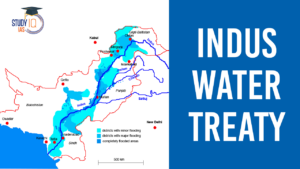Table of Contents
Context
- The Board of Control for Cricket in India (BCCI) officially communicated to the International Cricket Council (ICC) its decision to not send a team for the 2025 ICC Champions Trophy to be held in Pakistan.
- Though the reason was not officially explained it can be understood that this decision stems from ongoing concerns about terrorism, with the Indian government asserting that “terror and sport” cannot coexist.
The ICC Champions Trophy 2025 and the Venue Controversy
- Pakistan is set to host the ICC Champions Trophy 2025 (ODI) from February 19 to March 9, 2025, with matches scheduled in Lahore, Karachi, and Rawalpindi.
- India has requested a venue change from Lahore to Dubai, citing security concerns, but Pakistan resists this proposal.
- The impasse stems from India’s strict policy of not normalising ties with Pakistan amidst ongoing terrorism concerns and Pakistan’s desire to preserve its national pride by hosting the tournament in its territory.
Background on Terrorism and Indo-Pak Relations
- Pakistan’s support for terrorism against India dates back to the late 1970s and 1980s, initially focused on Punjab and Kashmir, later extending to Mumbai and Delhi.
- This strategy of promoting religious extremism has backfired, with Pakistan itself becoming a victim of terrorism and earning a global reputation as a hub for terrorist activities./
- India’s reluctance to play in Pakistan is influenced by persistent security threats in the host cities — Lahore, Karachi, and Rawalpindi.
- These cities have a history of sub-conventional violence, and nearby ideological terror centres (e.g., Muridke and Bahawalpur) pose additional risks.
- Militant groups like Tehreek-e-Taliban Pakistan (TTP), Jaish-e-Mohammed, and Jamaat-ud-Dawa (former Lashkar-e-Taiba) have been active in the region, and these groups are suspected to be linked to Pakistan’s deep state.
- India’s decision not to play in Pakistan aims to convince the international community about the real and latent threats existing in Pakistan, beyond the superficial display of security measures.
- g., Pakistan faces internal challenges, with the imprisonment of its former Prime Minister and cricket legend Imran Khan on questionable charges.
Past Cricketing Ties Amidst Terrorism
- Despite instances of terrorism, India and Pakistan continued playing cricket even after significant terror attacks like the 1993 Mumbai bombings and the 2001 Parliament attack.
- This continuity of cricketing ties contradicts the argument that “terror and cricket cannot go together.”
India’s Role: The Need for Diplomacy Over Isolation
- India’s approach of isolating Pakistan may backfire and lead to accusations of “big-nation arrogance” from neighbouring countries.
- Strengthening bonds through cricket, cinema, trade, and shared socio-cultural ties could weaken terrorism by fostering friendship and trust between the people of India and Pakistan.
- Recalling the enduring Olympic Truce, peace is best achieved not by the actions of leaders but through the goodwill and wisdom of the people.
Conclusion: Reviving People-to-People Ties
- To foster peace and mutual trust, the article advocates for reopening channels like sports, culture, and trade, which could serve as bridges of understanding between India and Pakistan.
- The legacy of the Olympic Truce serves as a reminder of the enduring value of peace, suggesting that these people-to-people ties could have a lasting impact on Indo-Pak relations.


 UDAN Scheme, Objectives, Funding and Ach...
UDAN Scheme, Objectives, Funding and Ach...
 Indus Water Treaty 1960 Suspended by Ind...
Indus Water Treaty 1960 Suspended by Ind...
 5 Years of SVAMITVA Scheme and Its Benef...
5 Years of SVAMITVA Scheme and Its Benef...





















